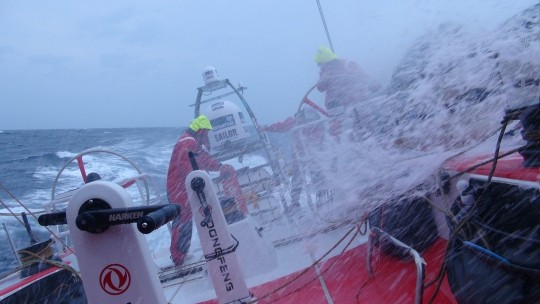
By Agathe Armand
Imagine being in the middle of the Pacific Ocean, sailing one of the Volvo Ocean Race’s toughest legs. The boat is a 65-foot carbon machine and it’s slamming down the waves. Now imagine you don’t speak the same language as your crewmates, but you’re still weeks away from your destination. Welcome onboard Dongfeng Race Team.
Liu Xue is on that boat. The 21-year old comes from Qingdao and has sailed for the past seven years. He has been selected with five other Chinese guys to sail the training leg from China to New Zealand with Dongfeng.
They left Sanya on Saturday.
Liu Xue, Jin Hao Chen, Liu Ming, Ying Kit Cheng, Jiru Yang and Yiran Zhang are now heading to Auckland with skipper Charles Caudrelier and a mixed bag of international candidates, sailing 5,264 nautical miles (9,749 km) for 20 days or so. It will be their longest offshore experience and their first time crossing the Equator.
There is one problem though. “I felt a bit embarrassed to speak English the first times I sailed with the team,” says Liu Xue. “I’ve only sailed inshore before and the vocabulary required for this race is much bigger.
Communicating with his Western crewmates has proved challenging for him. The truth is, the majority of the Chinese did not understand English very well when they first trialled, and worked through interpreters.
“I do feel the pressure, but I will overcome this barrier,” adds Liu Xue, who already has an English nickname, ‘Hey’. In Sanya’s Serenity Marina, instead of going to bed like the others, the Chinese went straight to English lessons after dinner.
“We want half of the crew to be Chinese,” says Caudrelier, a Frenchman who won the race last time around with Groupama. “Few of them know about ocean racing and it’s quite a challenge with the race starting in six months. But they are very keen and very dedicated, and they are working hard.”
So even if you don’t master the language, you can still make up for it with sheer enthusiasm?
“I’m already seeing their personalities and skills developing,” answers Caudrelier. “Some of them get it quicker; some are keener than others.”
Nick Cherry coached the aspirants in Sanya. “There are more similarities than differences between all those who dream of sailing the Volvo. Some of the Chinese guys certainly had a less diverse sailing background than you might expect from a similar group in the UK but the hunger and the drive are the same.”
“Some guys will naturally cope very well and others won’t,” warns Caudrelier. “I already have a good idea of who will do well from our training in Sanya, but you can never be too sure, which is why training legs like these are essential.”
No doubt his Chinese apprentices will learn lots about ocean racing, about safety, the boat and the weather. By the time they arrive in Auckland around mid-April, they should all know if they have good sea legs – or not.
But there is more to sailing than vocabulary and skills.
“Non-Chinese sailors are always happy while sailing,” says Liu Xue. “It’s not just a job for them. That’s the spirit of sailing we need to learn.”